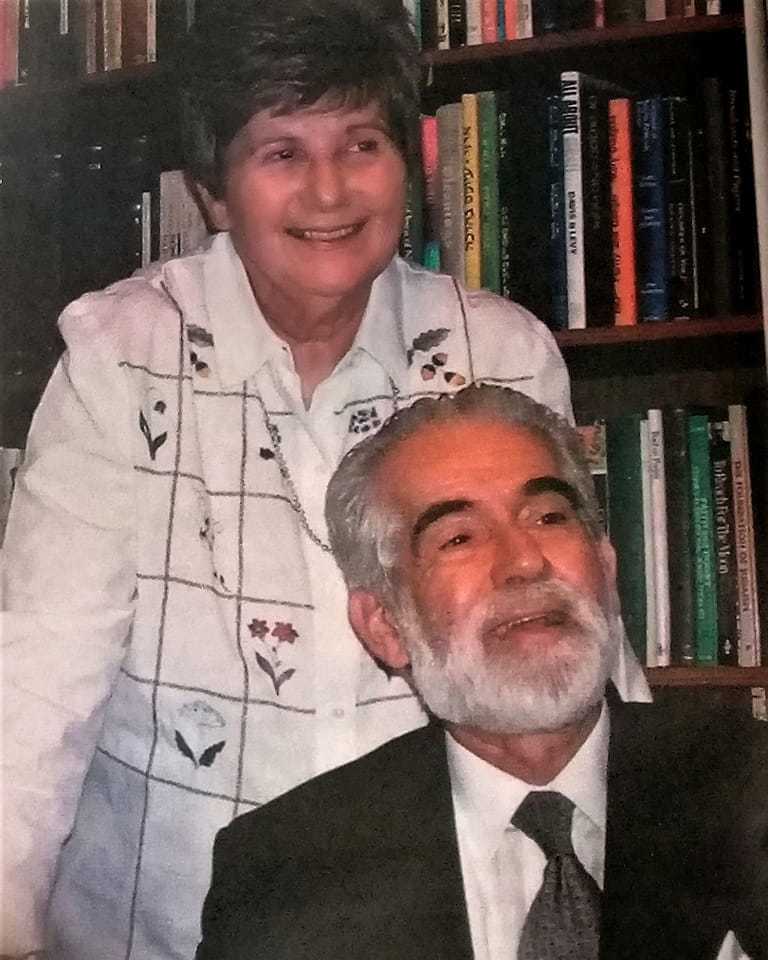A “Chief Rebbetzin” like no other.
We were much saddened to learn of the passing in Jerusalem over the weekend of our dear friend, colleague and mentor Ann Harris, o”h. Much was written in tribute to Ann when she went on aliya last year, but even this only sketched some of the high points of the remarkable 35 years she spent in our country. Jewish communal leader, human rights campaigner, lawyer, social upliftment activist – these were just some of the areas in which she made her mark, both during the years when her esteemed husband the late Rabbi Cyril Harris, obm, was Chief Rabbi and afterwards.
When thinking of Rabbi Cyril and Ann Harris – one of the most formidable husband and wife teams to serve our community - perhaps what most readily comes to mind is how they were from the outset among those at the forefront of leading SA Jewry into the new democratic era. They helped the Jewish community to embrace, with optimism and pride, the new society that was being born and also to be an active, identifying part of the transformation. During the equally challenging years that followed the transition to democracy, they were likewise extensively active in the process of healing and nation building.
It says a great deal about who Ann Harris that she had hardly been a year in South Africa when she travelled to Zambia as part of a delegation sent by the organisation Jews for Social Justice to meet representatives of the ANC in exile in Lusaka. For any Jewish leader at the time, this was a bold and controversial step to take as the ANC was still a banned organisation. She indeed came under fierce attack in influential quarters for going to Lusaka, but characteristically stood firm, saying that it would be short-sighted for Jewish leaders not to recognise that major changes were about to take place in South Africa and that it was incumbent upon them to prepare both themselves and the Jewish community for this.
In his address at the 1993 SAJBD national conference, Nelson Mandela appealed to the Jewish community “to make good the enormous lag caused by the ravages of Apartheid” by mounting programmes and contributing its skills - professional, commercial, and industrial - to the development of those who had been denied fair opportunities. Chief Rabbi Harris and businessman and communal leader Bertie Lubner responded by co-founding Tikkun (now Afrika Tikkun), a Jewish-headed social upliftment organisation that assists communities previously disadvantaged by apartheid. It was Ann who fleshed out the vision. She served (in a purely voluntary capacity) as Tikkun’s first Operations Director, and thereafter for many years on its board. In the words of former UOS – Western Cape Director Mickey Glass, it was “her personality, energy and passionate commitment to Jewish values that enabled her to lay the firm foundations on which an impressive and successful organisation has been built”.
Following Chief Rabbi Harris’ passing, she initiated the establishment of the Chief Rabbi Cyril Harris Memorial Foundation, which distributed significant sums to beneficiaries throughout the country for fifteen years.
Parallel to all of this was Ann’s continual involvement in the fostering of Jewish communal life, both within South Africa and, through the pivotal role she played in the African Jewish Congress (AJC), throughout the Southern African region. As AJC President, she represented the communities of Southern Africa on a range of international Jewish forums, including on the World Jewish Congress. AJC Spiritual Leader and CEO Rabbi Moshe Silberhaft would often travel alongside her and her husband to country towns and small southern African communities in his role as the SAJBD’s country communities’ rabbi. She had, he said, “a deep understanding of the challenges in southern African communities” and was also passionate about country communities. She was a resident of Hermanus for many years.
Ann had been a partner in a successful London law firm before coming to South Africa. Though she gave up her practice, she continued to be active in her chosen profession. As a lawyer, she involved herself extensively in women’s rights, including serving on the SA Law Commission’s Committee on Jewish Divorce which was led by Rabbi Cyril Harris, and which led to the passage of the Divorce [Amendment] Act of 1996. The Act allows South African courts to prevent a Jewish husband from obtaining a secular divorce without also providing a woman with a religious divorce. For many years, she was also extensively involved in the Wits Campus Law Clinic, including serving as chairperson of its governing committee and as acting director from 1993 to 1996.
All of this and more made Ann Harris an iconic figure in the Jewish community, one whose wisdom, energy and abilities went hand in hand with unswerving integrity and the highest ethical values. Jewish leaders were inspired by the example she set and countless South African across the board benefited immeasurably from her devoted efforts and skills she placed so unstintingly at their disposal. Ann tirelessly devoted herself to making a meaningful difference, and in so doing gained the gratitude and respect of everyone she worked with. May her memory be for a blessing.
The SAJBD extends its sincerest condolences to the Harris family. May they be comforted among the mourners of Zion and Jerusalem.
